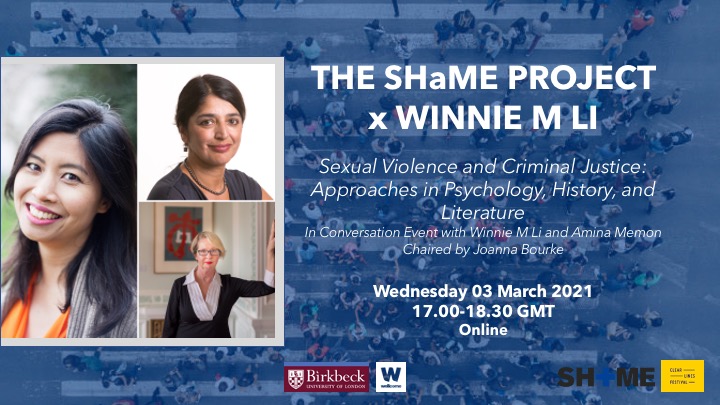On Wednesday 03 March 2021, SHaME launched its Writer in Residence Programme with a special In Conversation Event with Professor Amina Memon, Writer in Residence Winnie M Li, and SHaME Principal Investigator Professor Joanna Bourke.
‘Sexual Violence and Criminal Justice: Approaches in Psychology, History, and Literature’ was the first of three public events in the WiR Programme, a collaboration with survivor-centred arts organisation Clear Lines.
People from all over the world joined us for this unique online discussion, in which Professor Amina Memon, Professor Joanna Bourke, and Winnie M Li explored issues relating to the lived experience of sexual violence and its treatment in the criminal justice system. A wide-ranging conversation addressing the mental health aspects of experiencing sexual violence, the history of trauma, and how the criminal justice system can traumatise and re-traumatise victim-survivors was followed by an audience Q&A that delved into the problem with rape myths and victim-blaming stereotypes, the importance of advocacy and support for victims going through the criminal justice system, and how literature and the arts can help us forge a rape-free world.
You can watch a recording of the event here.

NEXT UP:
‘Literature and Sexual Trauma: Authors Writing Their Lived Experience’, is the second public event in the WiR Programme and will take place online on Wednesday 14 April 2021, 17.00-18.30 BST.
RESOURCES:
Balliot, H. et al, ‘Reason to disbelieve: evaluating the rape claims of women seeking asylum in the UK’, International Journal of Law in Context, 10/1 (March 2014; published online 31 January 2014), pp. 105-139. [article behind paywall]
Best, C., The Missing List – a memoir (Linen Press, 2018).
Crown Prosecution Service (UK), Draft guidance on pre-trial therapy.
Flowe, H.D. et al, ‘Rape Shield Laws and Sexual Behaviour Evidence: Effects of Consent Level and Women’s Sexual History on Rape Allegations’.
Gillen, Sir J., ‘Gillen Review: Report into the law and procedures in serious sexual offences in Northern Ireland – Recommendations‘, Department of Justice, Northern Ireland (09 May 2019).
Graham, L., State of Peril: Race and Rape in South African Literature (Oxford University Press, 2012).
Iannacone, E.L, The Spiral of Containment: Rape’s Aftermath (Pen Works Media, 2018).
Iannacone, E.L., The Spiral of Containment: Rape’s Aftermath, Travelling Art Exhibition.
Motsei, M., The Kanga and the Kangaroo Court: Reflections on the Rape Trial of Jacob Zuma (Jacana, 2007).
Sebold, A., Lucky (Hachette Book Group, 2002).
Thamm M., I Have Life: Raped, Stabbed & Left for Dead (Vision, 2004)
Thiara, R. and S. Roy, ‘Reclaiming Voice: Minoritised Women and Sexual Violence’ (Imkaan, 04 March 2020).
Una, Becoming/Unbecoming (Myriad Editions, 2015).
Venable Raine, N., After Silence: Rape & My Journey Back (Broadway Books, 1999).
Warrior Women website.
SPEAKER BIOGRAPHIES:

Winnie M Li is an author and activist, and Writer-in-Residence at SHaME. Her novel Dark Chapter is a fictional retelling of her real-life rape from victim and perpetrator perspectives. Translated into ten languages, it won The Guardian’s Not The Booker Prize, and was nominated for an Edgar Award and the Best First Novel Award. A Harvard graduate, Winnie founded Clear Lines, the UK’s first-ever festival addressing sexual assault and consent through the arts and discussion. Her ongoing PhD research at the London School of Economics explores media engagement by rape survivors as a form of activism. Winnie has appeared on the BBC, Sky News, Channel 4, The Guardian, The Times, The Mail on Sunday, BBC Woman’s Hour, and TEDx London. She has an honorary doctorate from the National University of Ireland in recognition of her writing and activism, and her second novel will be published in April 2022.
 Professor Amina Memon is a highly skilled researcher and teacher with 35 years of expertise in the field of Applied Cognitive and Social Psychology and over 130 publications. At Royal Holloway University, she directs the interdisciplinary Centre for the Study of Emotion and Law (CSEL). Her specialist areas are eyewitness testimony, investigative interviewing and biases in decision-making. A distinctive flavour of her work has been her close working relationship with policy makers and practitioners in the field of policing, social work and the law. Her applied research is aimed at identifying methods for improving justice for victims and witnesses and she has a long standing commitment to leveraging her standing in the community to support initiatives that support this. Current research projects including work on victim/witness memory, secondary traumatic stress in criminal justice professionals, the impact on emotion on credibility and best practice for questioning in face-to-face and remote investigations including asylum interviews. Amina has served as an expert witness in civil and criminal cases in the USA, Scotland and England. She has provided expert testimony and advised professionals investigating allegations of sexual abuse in child and adult cases and in investigations of historic abuse.
Professor Amina Memon is a highly skilled researcher and teacher with 35 years of expertise in the field of Applied Cognitive and Social Psychology and over 130 publications. At Royal Holloway University, she directs the interdisciplinary Centre for the Study of Emotion and Law (CSEL). Her specialist areas are eyewitness testimony, investigative interviewing and biases in decision-making. A distinctive flavour of her work has been her close working relationship with policy makers and practitioners in the field of policing, social work and the law. Her applied research is aimed at identifying methods for improving justice for victims and witnesses and she has a long standing commitment to leveraging her standing in the community to support initiatives that support this. Current research projects including work on victim/witness memory, secondary traumatic stress in criminal justice professionals, the impact on emotion on credibility and best practice for questioning in face-to-face and remote investigations including asylum interviews. Amina has served as an expert witness in civil and criminal cases in the USA, Scotland and England. She has provided expert testimony and advised professionals investigating allegations of sexual abuse in child and adult cases and in investigations of historic abuse.
 Joanna Bourke is Professor of History at Birkbeck, University of London, Professor of Rhetoric at Gresham College, and a Fellow of the British Academy. She is the Principal Investigator of the SHaME project. She is the prize-winning author of fourteen books, as well as over 100 articles in academic journals. Among others, she is the author of Rape: A History from the 1860s to the Present (2007), What it Means To Be Human: Reflections from 1791 to the Present (2011), and The Story of Pain: From Prayer to Painkillers (2014). Princeton University Press will publish Sexual Violence: A Global History from the 1830s to #MeToo in late 2021. Her books have been translated into Chinese, Russian, Spanish, Catalan, Italian, Portuguese, Czech, Turkish, and Greek. She is a frequent contributor to TV and radio shows, and a regular correspondent for newspapers.
Joanna Bourke is Professor of History at Birkbeck, University of London, Professor of Rhetoric at Gresham College, and a Fellow of the British Academy. She is the Principal Investigator of the SHaME project. She is the prize-winning author of fourteen books, as well as over 100 articles in academic journals. Among others, she is the author of Rape: A History from the 1860s to the Present (2007), What it Means To Be Human: Reflections from 1791 to the Present (2011), and The Story of Pain: From Prayer to Painkillers (2014). Princeton University Press will publish Sexual Violence: A Global History from the 1830s to #MeToo in late 2021. Her books have been translated into Chinese, Russian, Spanish, Catalan, Italian, Portuguese, Czech, Turkish, and Greek. She is a frequent contributor to TV and radio shows, and a regular correspondent for newspapers.